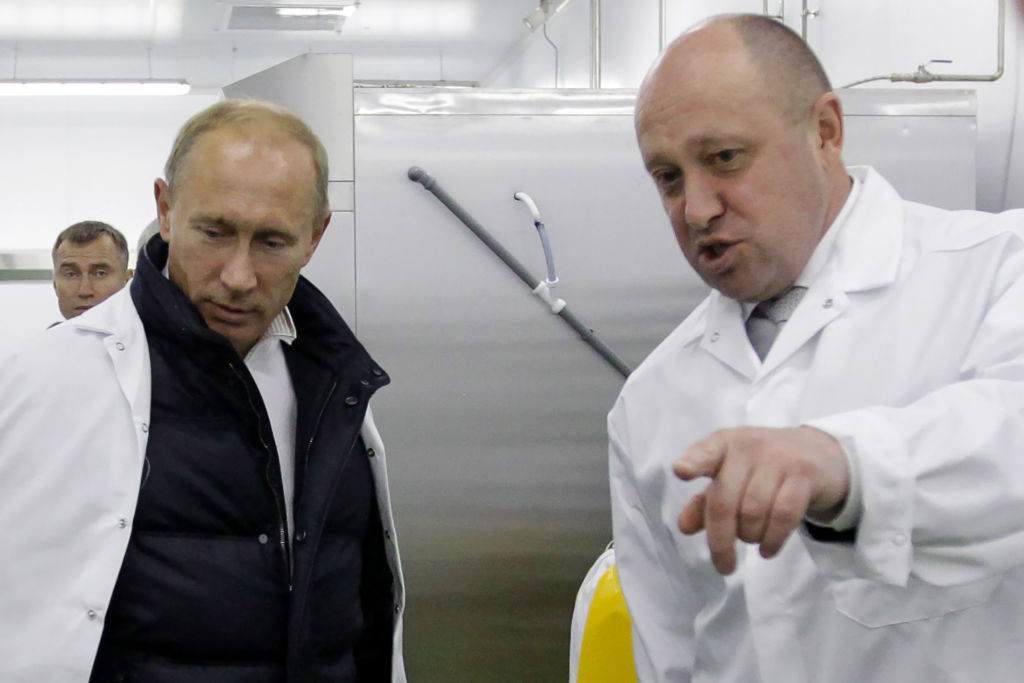It’s satisfying when a jigsaw piece slots into place. Today we heard that Wagner leader Evgeny Prigozhin met Vladimir Putin in the Kremlin just a few days after his abortive mutiny of 23-24 June. That detail helps clear up some of the confusion of this past week.
How come Prigozhin has been at liberty in Russia? We were told he would be going directly into exile in Belarus. Why is the Federal Security Service (FSB) apparently no longer seeking to arrest him? Is his Wagner mercenary army being disbanded or not?
Putin’s spokesman Dmitry Peskov has now acknowledged that, on 29 June, Prigozhin was among 35 people invited to a three-hour meeting in Moscow held to discuss the war. Present was a cross-section of the military elite, as well as Prigozhin, who were treated to Putin’s ‘assessment of the company’s actions on the front’ and his take on ‘the events of 24 June.’ Wagner fighters were reportedly offered ‘further options for [their] employment and further combat use,’ so long as they were ‘ready to continue to fight’ for Russia.
Unofficially, there are claims that Prigozhin also met Putin and some of his senior staff in a separate meeting. This reportedly included Security Council secretary Nikolai Patrushev and National Guard commander General Viktor Zolotov, but not Prigozhin’s bête noire, Defence Minister Sergei Shoigu.
The outcome seems to have been, first of all, a stay of execution. Prigozhin remains at liberty to tidy up his affairs in Russia and liquidate what assets he can, but only temporarily, and so long as he keeps a low profile. He has been unusually quiet on social media and he disappointed many of his supporters, who had hoped he would attend a meeting they held in St Petersburg this weekend.
This is certainly a further compromise on Putin’s part, and reflects his unwillingness to take tough and ruthless personnel decisions. He is willing to see Ukrainians bombed by the dozen, but not confront any of the figures in his own circle.
The expectation is that Prigozhin will go to Minsk in due course. The FSB is keeping up the pressure, including the recent release of footage from a search of his estate and some truly bizarre bewigged and costumed selfies of his. It is a signal that he is not to outstay the president’s indulgence.
Putin seems to have decided to try and retain the international dimension of Wagner, which is active especially in Africa
As for Wagner, a field commander under the callsign ‘Lotus’ confirmed that he and his men had been put on leave for the next few weeks, but that it was envisaged they would be heading for Belarus after. The defence ministry is continuing to try and persuade them to join its own mercenary formations, but uptake so far seems relatively poor. In the final analysis, some may well take the tsar’s ruble, some will use the opportunity to head home, and others will follow Prigozhin.
There have been some overheated theories that suggested there was the plot all along: Putin stage-managed the coup as an excuse to deploy Wagner to Belarus, either to open a new front against Ukraine or to put pressure on Belarusian president Alexander Lukashenko. Those seem unlikely. A few thousand Wagner fighters – most of whose tanks and heavy artillery appears to have been reappropriated by the regular military – pose no real threat to Kyiv’s northern approaches.
As for Belarus, Lukashenko is at least expressing no dismay at the likely influx of several thousand experienced mercenaries. Indeed, he issued a broad hint that they would be welcome were they to choose to enrol in his army. More to the point, Putin seems to have decided to try and retain the international dimension of Wagner, which is active especially in Africa. There, after all, its operations are lucrative and also act as a kind of Russian power projection. If Prigozhin is ultimately expected to run this enterprise from Minsk, Lukashenko no doubt anticipates that some of its ill-gotten revenues will flow into his own coffers, by hook or by crook.
In truth, it is unlikely this ramshackle compromise will work. The Concord Group, Prigozhin’s umbrella corporation, is already being picked apart by rivals. Much of Wagner’s success abroad depended on its role as part of a wider offer of what one could call ‘authoritarian support services’, from trigger-pullers to political technologists. Besides, once out of Russia, Prigozhin may not be that willing to able to continue to work for Moscow’s benefit. (Indeed, he could assume that once the dust has settled, a vengeful Putin will be after him).
Dealing with Prigozhin has been a classic Putin fudge, a compromise to try and keep everyone – even mutineers – happy. The long-term consequences have been given little thought.







Comments